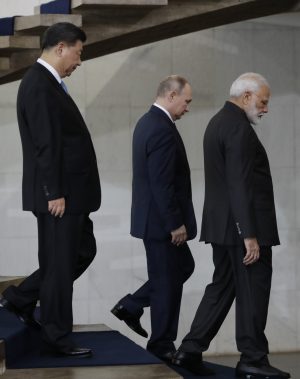Several years ago, India’s then-Prime Minister Manmohan Singh went to the United States, then led by President Barack Obama. Singh was hosted for the first state dinner of the Obama presidency. The two leaders argued that theirs was not merely a strategic relationship between two governments; it was a policy response to an ongoing love affair between two peoples.
“I think that the United States and India are natural allies,” Obama said. “We have a range of shared values and ideals. We’re both entrepreneurial societies. We’re both multiethnic societies. We are societies that believe in human rights and core freedoms that are enshrined in our founding documents.”
Singh concurred. “When India and the United States meet, it is a moment to celebrate the values of democracy, pluralism, liberty, and freedom,” he said. “In our discussions today, there was a meeting of minds.”
Fifteen years later, New Delhi has largely dispensed of this “meeting of minds.” Instead, it has adopted a frontal attack on the West and what it perceives as the West’s hegemony of the world.
The immediate context is a clash over values. Amid India’s ongoing parliamentary elections, Prime Minister Narendra Modi’s government has come under sharp criticism from abroad for restrictions on the press, the imprisonment of political opponents, and hate speech against India’s Muslims.
In March, the U.N. High Commissioner for Human Rights, Volker Turk, delivered an unflattering appraisal. “I appreciate the country’s secular and democratic traditions and its great diversity,” he said. “I am, however, concerned by increasing restrictions on the civic space — with human rights defenders, journalists and perceived critics targeted — as well as by hate speech and discrimination against minorities, especially Muslims.”
Last week, an organization affiliated with the U.N. in Geneva deferred the accreditation of India’s National Human Rights Commission over concerns of political interference in its functioning and lack of representation of minorities. The deferment could have consequences for the commission’s ability to represent India at the U.N. Human Rights Council or hold governance positions in that organization.
These developments followed a steady downgrading of India’s democracy on various parameters of freedom and institutional independence by multiple organizations based in the West. In its latest report, released this March, Sweden’s V-Dem Institute called India “one of the worst autocratizers.” The following month, the U.S. State Department’s annual human rights report cited “significant human rights issues” in India’s conflict-stricken northeastern state of Manipur.
Reprimands from abroad sit uneasily with Modi’s election campaign. Over the last several months, starting with India’s presidency of the G-20 last year, Modi has sought to convince voters that he has improved India’s reputation and stature on the world stage. If institutions in the West regularly upbraid New Delhi, that would be inconsistent with Modi’s message.
In that context, India’s External Affairs Minister Subrahmanyam Jaishankar has adopted increasingly bellicose rhetoric against the West to discredit its criticism. “Western countries actually feel that they have influenced the world for the last 200-300 years,” Jaishankar said most recently. “How do you expect someone who has been in that position to give up those old habits so easily? [The Western media] will reputationally damage you, they will bring out an index and put you down.”
It would be easy to write off Jaishankar’s strident rhetoric as the product of electioneering, but that would be inaccurate. For years, Jaishankar has been arguing that powerful political interest groups in the West are arranged against India. In the aftermath of a controversial BBC documentary on Modi last year, Jaishankar accused the West of engaging in “politics by other means.” The West is invested in shaping “a very extremist image of India, of the government, of the Prime Minister,” Jaishankar said. “This has been going on for a decade.”
Jaishankar’s criticism of the West echoes the complaints one often hears in Beijing and Moscow because it reflects a very similar frustration: that a Hindu nationalist India may never achieve power and recognition in a world still dominated by the West and its institutions.
This is a new turn for India’s foreign policy. New Delhi has always argued for multipolarity under successive governments in an effort to raise its own profile. Yet, at least since the turn of the century, it has rarely argued for the upturning of Western hegemony the way China or Russia have long done.
Instead, in the aftermath of the landmark nuclear deal with the U.S., India saw Western hegemony as a possible vehicle for its own admission into the ranks of global powers. India widely marketed its credentials as a liberal, multicultural democracy in a very Western sense and lobbied for support in Europe and America for its inclusion in the world’s decision-making councils. The argument was that since India practices the same values as the West, it would likely pursue the same global outcomes as the West.
Multilateral institutions built by the West appeared to support that assessment. Take India’s National Human Rights Commission, for instance, which failed to win accreditation at the U.N. this month. In 2006, India’s commission was given the highest grade for compliance with international standards for institutional independence and effectiveness. That grade was reaffirmed upon periodic review in 2011. But starting from 2016, two years after Modi came to power, India’s rating became a matter of controversy, culminating in the ongoing crisis.
New Delhi therefore sees the proliferation of liberal norms and the Western world order as a direct threat to the success of Hindu nationalism. As civil society institutions and multilateral agencies based in the West publicly call India’s democratic credentials into question, the Modi government will look to push back by discrediting the U.S. and its global hegemony.
India’s democracy was once feted by the West as a model for the developing world. Now, it is increasingly treated as a has-been. That puts India on a collision course with the West’s global interests.
































